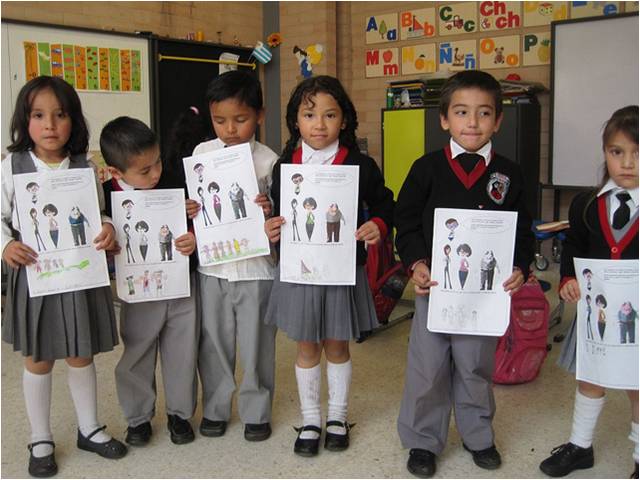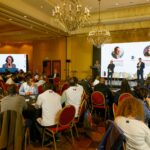Kaissa Consulting interviews Thierry Weishaupt, CEO of the Education and Solidarity Network
Click here to read the article on Kaissa Consulting’s website
The Education and Solidarity Network was founded by organisations working in the sectors of mutual health insurance and education. Their aim was to bring together different groups with the shared belief that education, health and solidarity are at the heart of human development. Today, the Network offers advice and support to new mutual health insurers, which precede systems of social security for the whole population. Thierry Weishaupt, CEO of the Education and Solidarity Network, gives us his point of view.

Social security education for school children, organised by the Inter-American Centre for Studies (CIESS) in Colombia
What are the objectives of the Education and Solidarity Network?
The project was initially supported by three founders:
- Education International (EI), a federation that brings together all trade unions in the education sector globally,
- the Association internationale de la mutualité (AIM), which unites mutual health insurers internationally,
- and the Mutuelle Générale de l’Education Nationale (MGEN), one of the leading providers of health insurance in France which has worked closely with the world of education since its creation.
The Network’s member organisations coordinate solidarity projects and international projects based on three objectives:
- To make health a key issue in schools for every member involved in the education of children, and therefore prioritising issues such as the health of teachers in the workplace, the well-being of pupils and ensuring that their families are well-informed;
- To develop solidarity frameworks for health based on the principal of mutual insurance in particular, and in coordination with the fields of education and training;
- To promote the principle of solidarity among young people.
What is the perception of social security in developing countries?
At state level, perceptions of social security are evolving, and shifting from a focus on cost to a focus on investment. This investment is necessary for human development, which in turn creates both economic competitiveness and social peace.
Unfortunately, for local populations, it is mostly still a luxury that comes after the challenges of daily life, due to low incomes. 80% of the global population today do not have access to adequate social security.
How can education contribute to the establishment of a system?
It is difficult to understand social security and its components, particularly health insurance, education and retirement, due to its limited reach and complex mechanisms. Many struggle to understand its importance. It is therefore necessary to supplement social security access with measures to raise awareness and educate local populations. It is especially important to educate future generations so that they can integrate the following two principles into their way of thinking:
- the protection that social security can provide against risks
- the importance of an approach prioritising mutual insurance and solidarity in order to make social security affordable for everyone.
This education is important in countries where the foundations for social security are being laid. However, education is also important in developed countries where social security has existed for decades and where young generations are no longer aware of its importance.
How much importance is placed on education and training when the Network helps to set up mutual insurance companies?
Let’s take an example. In Burkina Faso, we support trade unions that represent basic education organisations to set up their mutual insurance, which is a precursor to the development of universal health insurance for the whole population. All those involved, from trade unions to public authorities, understood the pivotal role that this project would play, for the following reasons:
- Education professionals who will be actively involved in their mutual health insurance must receive training on how to manage it.
- They will then be able to raise awareness among other population groups about the benefits and practical aspects of setting up mutual health insurance; this will extend the reach of a solidarity-based model which the government of Burkina Faso wants to use to include urgent medical assistance (AMU).
- These same professionals and their government departments, as well as other groups on the ground, will able to establish an education programme for health aimed at young people, so that future generations are aware of issues related to social security from a young age.
In terms of education, which categories of the population (teachers, medical staff etc.) can help to promote education about social security?
While the core of Network projects is managed by professionals from the education or mutual insurance sectors, innovation always stems from debate or cooperation with other groups. If we look at Burkina Faso again, we work with organisations in Luxembourg, including the Pharmacists without Borders association of Luxembourg. In the same way, our social security programme in Haiti, run in conjunction with a Solidarité Laïque (Secular Solidarity) project, brought together education professionals, parents of schoolchildren and social security organisations. Their joint efforts were supported by the expertise of the Inter-American Centre for Social Security Studies (CIESS), based on an education programme with worldwide reach.
What types of concrete measures have been taken by the Network with this aim in mind?
Each country and each case are unique. For our most recent programme in Colombia, in collaboration with the Mutual Insurers Alliance for the Americas (AMA) and its local branch Gerstasalud, it was decided locally that the programme would be aimed at young people entering into the world of work. The programme of activities will be organised differently to take this into account, and to respond to the needs and specific attitudes of two specific groups:
- young graduates from urban universities;
- young people with education and training on farming techniques in rural areas.
What are the principal obstacles to overcome?
The principal obstacle is to convince large institutions that the approach to social security is not only financial, and top-down in terms of communication; it is also necessary for local populations to have control. In the Network, we always say that every programme should have three aspects: education to enable understanding of the system; tools for understanding the benefits and practical solutions offered by social security, and for participating in building the system; a commitment to enabling action and proficient use of the system.
Contrary to what you might think, mobilising people is rarely the difficult part. As soon as they are given the opportunity to learn, express themselves, and to get involved, the results always surprise us, even in a country as complex as Haiti!




